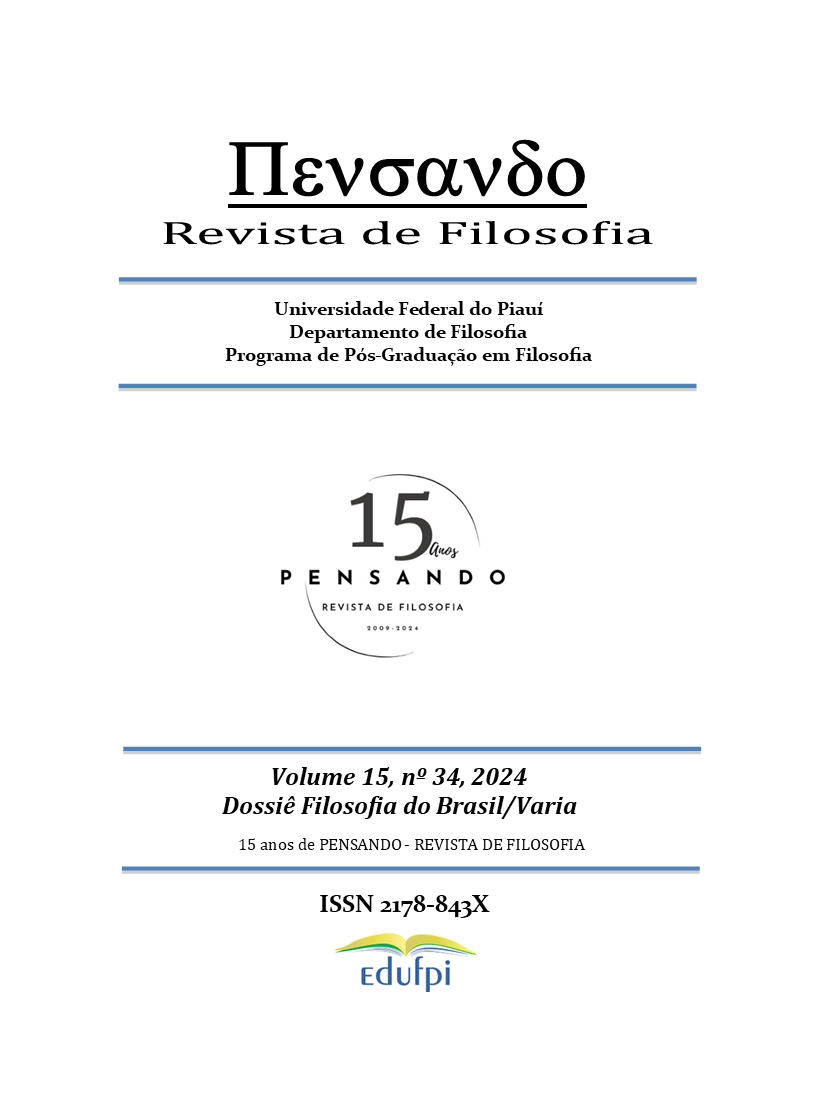Factualism about practical reasons
a defense
DOI:
https://doi.org/10.26694/pensando.vol15i35.4498Palavras-chave:
razões para ação, factualismo, Disjuntivismo, Jonathan DancyResumo
O artigo tem como objetivo investigar se o factualismo sobre razões práticas pode fornecer uma resposta satisfatória ao problema dos casos de erro. Alguns filósofos assumiram que o factualismo é fortemente ameaçado pela possibilidade de crença falsa. Eles afirmam que se o agente está enganado sobre o fato relevante, então não há fato ao qual ele possa apelar para justificar e explicar sua ação. Então, para avaliar a força da objeção, considero a resposta factualista de Jonathan Dancy ao problema e argumento que, embora bastante convincente, requer um comprometimento com a ideia estranha de que a explicação intencional pode ser não-factiva. O relato de Dancy implica negar a tese amplamente aceita de que uma explicação verdadeira não pode ter uma falsidade como seu explanans. Mas, ao contrário do que se poderia pensar, defendo que o factualismo pode lidar com casos de erro sem ter que endossar a ideia controversa de Dancy. Para mostrar isso, desenvolvo uma forma disjuntivista de factualismo que pode resolver o problema em jogo mantendo o que é mais promissor nesta teoria: que todas as construções porque são factivas. Se minha tese for bem-sucedida, então acho que não há razão para desistirmos do factualismo diante de casos de erro.
Referências
DANCY, Jonathan. “Why There is Really No Such Thing as the Theory of Motivation”. Proceedings of the Aristotelian Society, 95, 1995 pp. 1:18.
DANCY, Jonathan. Practical Reality. Oxford: Oxford University Press, 2000.
DANCY, Jonathan. “A Précis of Practical Reality”. Philosophy and Phenomenological Research, 67(2), 2003, pp 423-28.
https://doi.org/10.1111/j.1933-1592.2003.tb00298.x
DANCY, Jonathan. “Acting in the Light of the Appearances”. In: MACDONALD, Cynthia; MACDONALD, Graham. McDowell and his Critics. Malden: Blackwell Publishing, 2006, pp. 121-31.
DANCY, Jonathan. “On How to Act Disjunctively”. In: HADDOCK, Adrian; MACPHERSON, Fiona (Eds). Disjunctivism: Perception, Action, Knowledge. Oxford: Oxford University Press, 2008, pp. 29-49.
DANCY, Jonathan. “On Knowing One’s Own Reasons”. In: LITTLEJOHN, Clayton; TURRI, John (Eds). Epistemic Norms, New Essays on Action and Assertion. Oxford: Oxford University Press, 2014, pp. 81-96.
DAVIDSON, Donald. “Actions, Reasons, and Causes”. The Journal of Philosophy, 60, 1963, pp. 685-700. https://doi.org/10.2307/2023177.
GETTIER, Edmund L. “Is Justified True Belief Knowledge?” Analysis 23, 1963, pp. 121-3. https://doi.org/10.1093/analys/23.6.121
HADDOCK, Adrian; MACPHERSON, Fiona (Eds). Disjunctivism: Perception, Action, Knowledge. Oxford: Oxford University Press, 2008.
HARMAN, Gilbert. “Moral Relativism Defended”. Philosophical Review, 84, 1975, pp. 3-22.
HEUER, Ulrike. “Reasons for Actions and Desires”. Philosophical Studies, 121, 2004, pp. 43-63. https://doi.org/10.1023/B:PHIL.0000040381.54358.08.
HIERONYMI, Pamela. “Reasons for Action”. Proceedings of the Aristotelian Society, 111, 2011, pp. 407-27. https://doi.org/10.1111/j.1467-9264.2011.00316.x.
HORNSBY. Jennifer. “A disjunctive conception of acting for reasons”. In: HADDOCK, Adrian; MACPHERSON, Fiona. (Eds). Disjunctivism: Perception, Action, Knowledge. Oxford: Oxford University Press, 2008, pp. 244-61.
HUTCHESON, Francis. Illustration on the Moral Sense. Cambridge: Harvard University Press, 1971.
KORSGAARD, Christine. Self-Constitution: Agency, Identity, and Integrity. Oxford: Oxford University Press, 2009.
MCDOWELL, John. “Criteria, Defeasibility and Knowledge”. Proceedings of the British Academy, 68, 1982, pp. 455-79.
MCDOWELL, John. Mind and World. Cambridge: Harvard University Press, 1994.
MCDOWELL, John. “Acting in the Light of a Fact”. In: BAKHURST, David; HOOKER, Brad.; LITTLE, Margaret O (Eds). Thinking about Reasons: Themes from the Philosophy of Jonathan Dancy. Oxford: Oxford University Press, 2013, pp. 13-28.
QUINN, Warren. Morality and Action. Cambridge: Cambridge University Press, 1993.
PARFIT, Derek. “Reasons and Motivation”. Aristotelian Society, Supplementary Volume, 71, 1997, pp. 99-130.
SANDIS, Constantine. “Can Action Explanations Ever Be Non-Factive?” In: BAKHURST, David; HOOKER, Brad; LITTLE, Margaret O (Eds). Thinking about Reasons: Themes from the Philosophy of Jonathan Dancy. Oxford: Oxford University Press, 2013, pp. 29-49.
SCANLON, Thomas M. Being Realistic about Reasons. Oxford: Oxford University Press, 2014.
SMITH, Michael. The Moral Problem. Oxford: Wiley-Blackwell, 1994.
SMITH, Michael. “Four Objections to the Standard Story of Action (and Four Replies)”. Philosophical Issues, 22, 2012, pp. 387-401. https://doi.org/10.1111/j.1533-6077.2012.00236.x
SNOWDON, Paul. “Hilton and the Origins of Disjunctivist”. In: HADDOCK, Adrian; MACPHERSON, Fiona. (Eds). Disjunctivism: Perception, Action, Knowledge. Oxford: Oxford University Press, 2008, pp. 35-56.
STOUT, Rowland. “Sally’s Reason for Running from the Bear”. In: SANDIS, Constantine (Ed). New Essays on the Explanation of Action. London: Palgrave Macmillan, 2009, pp. 48-61.
TURRI, John. “The Ontology of Epistemic Reasons”. Noûs, 43, 2009, pp. 490-512.
WILAND, Eric. “Theories of Practical Reason”. Metaphilosophy, 33, 2002, pp. 450-67. https://doi.org/10.1111/1467-9973.00239
WILLASCHEK, Marcus. Disjunctivism: Disjunctive Accounts in Epistemology and in the Philosophy of Perception. New York: Routledge, 2012.
WILLIAMS, Bernard. “Internal and External Reasons”. In: WILLIAMS, Bernard. Moral Luck. Cambridge: Cambridge University Press, 1981, pp. 101-13.
Downloads
Publicado
Como Citar
Edição
Seção
Licença
Copyright (c) 2023 PENSANDO - REVISTA DE FILOSOFIA

Este trabalho está licenciado sob uma licença Creative Commons Attribution 4.0 International License.

























